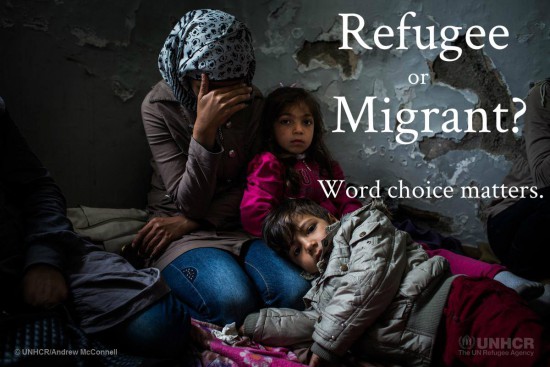Refugees, Migrants and Xenophobia in the Macedonian Media
Published in Analyses
on 5 - 09 - 2015 Author: Мирјана Најчевска
„Refugee or migrant? Word choice matters.“ Photo: UNHCR.
What are the key problems of the media reporting when it comes to refugees and migrants who pass through Macedonia?
Author: Prof. d-r Mirjana Najchevska, human rights expert
The problem with one of the most marginalized groups in the world, the refugees – the illegal migrants, the asylum seekers, caught the attention of the Macedonian media at the beginning of this year. There were dramatic titles in some media, such as “Macedonia – migrant murderer”, and the subject was also widely analyzed.
The situation had grown further with the increased number of people who wanted to pass through Macedonia but also with the rise of the interest in Europe and around the world in the plight of people from the Middle East and Africa who are trying to come to Europe.
Media have a highly important role in situations like this. They can be promotors and protectors of human rights, as well as control the government while it performs its duties delegated in accordance with the international agreements. Though, sometimes the media can also be promotors of xenophobia and hatred.
After the initial lack of interest for the people passing through the Republic of Macedonia on their way to Europe, but also after the rise of great concern after the series of uninvestigated fatalities (which remain insufficiently investigated until today) and the rise of the numbers of the asylum seekers on the Greek-Macedonian border, the media turned their attention to this issue again.
- 51.300 migrants proclaimed their intent to seek asylum intention, but only 49 people applied for asylum so far.
- UNICEF opens station for the migrant children near Gevgelija
However, there are two main issues regarding the media reports about this situation. The lack of clear distinction of terms migrant and refugee is the first problem.
The term “migrants” is used in a large number of media reports, whereas the term “refugees” is used less, but in most cases they are used interchangeably, as synonyms. Only in several cases they were used as non-indentical terms.
- New migrant wave – Nearly 4 thousand refugees squashed Gevgelija
- Beaten, robbed, frightened – the refugee wave drives on toward Germany
Overhelmingly, there is lack of distinction between the terms “migrant” and “refugee”. For instance, the article: “Macedonia capitulates in front of the migrants’ rush” is actually using the term “refugees”:
“Many refugees want to reach Hungary before the country fences off its border. Numbers of Balkan route migrants explode. The authorities are helpless. Can we expect a European strategy?”
We have similar situation in the following title “Horrifying – Four refugee children among the suffocated in a truck”:
“The police in Hungary arrested 3 people who are suspected of migrant smuggling.”
“200 migrants drowned in the Mediterranean on their way to Europe”
“Libya (AP) – Libyan authorities are collecting bodies of the drowned migrants near the port city of Zuwarah and they are afraid that there are 200 dead bodies of desperate people, who in this latest catastrophe lost their lives trying to reach Europe.”
Some media speak about “migrants” and “refugees”, but as non-identical synonyms. For instance: “More than 300.000 refugees crossed the Mediterranean on their way to Europe”, which is probably the closest to the real situation.
Definitions about the terms “migrant” and “refugee” are given in exceptionally small number of media. “Faktor” gives most precise information:
““Reuters” published detailed explanation regarding the difference between the terms “migrant”, “asylum seeker” and “refugee””. These words are usually interchangeable, however the differences are enormous and they even relate to the attitude towards different groups.”
Most striking cases are when media, (for example Vecher newspaper), even though they point out to the differences between the terms migrant and refugee, would mix these two terms in some other article (or even in the same article). For instance, there was an attempt to differentiate the terms in the article titled “There is a way out for refugees, but there is no salvation for migrants”, but in the article itself we do not see the principe appied. Couple of days later in the same newspaper, in the article titled “Migrant transport runs with no problems”, we see no signs of distinction at all.
Differentiating the terms “migrant” and “refugee” is of crucial importance. Migrants are people who decided to move primarily due to economic reasons or due to personal comfort i.e. preference, and generaly by free will, i.e. without the influence of a outside relevant factor. They decide on their own when to leave their home and where to go, despite the fact that the available options could be extremely limited. On the other hand, a refugee is a person who is justifiably afraid that he or she can be exiled during wars due to his/her race, religion, nationality, affiliation to a concrete social group or political belief, and hence leave his/her own country (unlike the displaced persons, who flee from endangered areas, but do not leave their own country). The terminological distinction is of equal formal importance (administration of distinct international documents – “International Migration Convention” which Macedonia hasn’t ratified yet, and “Convention and protocol relating to the status of refugees” ratified by Macedonia.) From a legal point of view, the responsibility of a country for and towards the concrete category is precisely determined by this, while the reasons for leaving the mother country are key criteria.
The confusion of these terms continues in the media analysis content. For instance, in the “Lokalno” medium, stories about the migrants and refugees, military actions, bad economic condition, political and economic solutions, are placed in an article titled as “Refugee tsunami comes in the next several months – Europe is on alert!”.
All of this creates a total informational chaos, but above all it creates a feeling of endangerment and fear or at least dread from the “others”, who come in large numbers and “hit” people’s everyday life with immense power.
Inspiring xenophobia and enmity towards people crossing the Macedonian border (whether they are migrants or refugees) is the second problem in media’s reporting.
The sense of endangerment if augmented by the imprudent reports of the high officials’ statements. One such example is Nikola Gruevski’s statement (at the time when he was Prime minister) and according to him “The migrants’ wave will continue to rise”.
Highly widespread manner of disseminating fear is publishing and spreading stories in which the written content is presented as facts, although it cannot be checked, cannot be proven and cannot even be seen as general situation. For instance, the website “Kalimero” published an article titled as “The migrants showed their teeth: ‘Instead of churches, there will be minarets’” (the very same article appeared in the Vecher newspaper titled “Ahmed from Libya reached Serbia: Instead of churches, there will be minarets in Europe. That will be our revenge!”, by which xenophobia and islamophobia are directly instigated.
“I do not have any complaints about the Serbs. However, Greece, Hungary, Slovakia and Croatia are NATO member states. It is true that they didn’t bombard my country, but don’t they participate in the NATO’s military budget? Don’t they send their troops in Afghanistan and Iraq? They won’t escape the punishment. NATO is a bloody conqueror of the Middle East, and the weak Europe, which gave in to the American Satan, will be destroyed. Our women will give birth to many children. Europe’s face will be completely changed in five years. I am not looking forward to that. I respect the grand European culture and I don’t want minarets instead of churches. But, that’s how it’s going to be. That’s revenge! Inshallah! Ahmed says.”
The following titles “Terrorists among migrants: ISIS’ commander entered Greece and passes through Macedonia as a migrant!” published by the website INFOMAX, and the title “Photo: Is this the real image of the Syrian migrants?” published on the website “Kurir”, are supposed to cause similar effect.
TV channel “Alfa” goes one step further and puts the refugees directly in the very context of terrorism. In the article: “Terrorism becomes more serious threat in the world – Macedonia is prepared” it is said:
“And prime minister Gruevski believes that the migrant crisis is just the beginning of a new kind of Migration Period, which will start to gain ground. Terrorism threats lurk above entire Europe, according to him.”
The article “4.000 terrorists used the refugee routes”, published by the website “Republika” ends with direct threat towards refugees and direct call for active attacks by the citizens:
”If the refugees are in any way connected to terrorism while on Macedonian territory, then it is more than likely they shall experience additional pressure on their way to peace and prosperity. If so, due to police’s reinforced precaution measures and increased antagonism in the public, they could confront attacks, revanchism and violence by Macedonian citizens which could be several times larger than the current crime and thefts they are dealing with now.”
Only a small number of media give information about the reasons of the refugee crisis as well as information that confronts the general idea that there is planned invasion of Europe/Balkans/Macedonia by the Muslims/islamists/terrorists.
- The countries which accepted most Syrian migrants
- 216.700 people died in the Syrian war
- VIDEO: Short analysis explaining the refugee problem
Only analyses of this kind can help in understanding the real situation, can help in constructing opinions based on the human rights concept and above all, can help in pointing out to our country and other countries too, as active factors in the protection of the fundamental rights and freedoms of every human.

